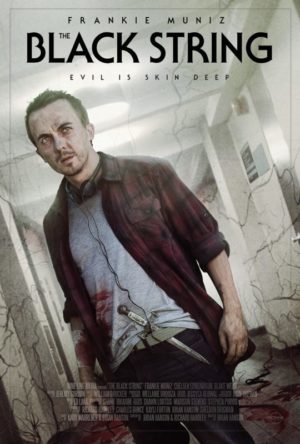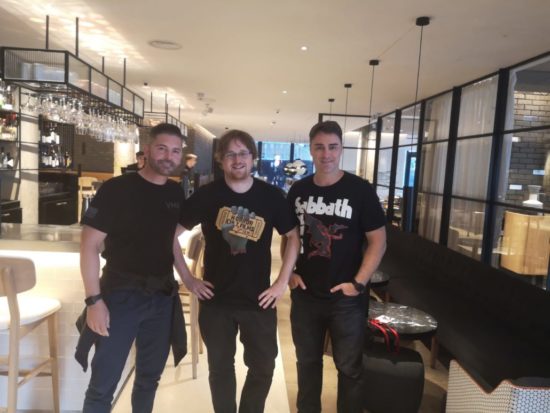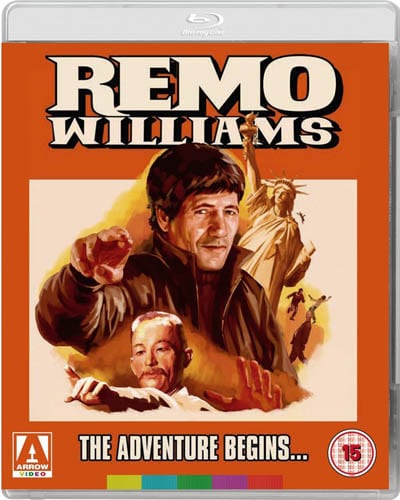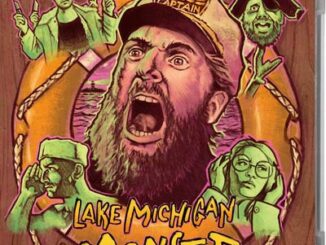
Of the many oddities that I saw at FrightFest this year, including Stiffler being a killer, maybe the weirdest was watching Agent Cody Banks grown up and calling a sex-line. This is how The Black String starts: a paranoia thriller that, depending on how you watch it, is either a tale of witchcraft or a young man losing his mind. To celebrate it showing at FrightFest, Horror Cult Films sat down with director/ co-writer Brian Hanson and producer/ co-writer/ cast member Richard Handley. Among other things, we talked about creating it, funding it, casting it and mental health.
So how did The Black String start of?
Brian: The idea came from my bar-tending, a very good friend and very good writer, Andy Warner and I. We wanted to make a micro-budget movie and there were a lot of haunted house movies, and orphans and abandoned buildings so we said let’s make a movie about the suburbs and terrible things going on in familiar surroundings. So we started to work out this story about a guy, could be us or anyone we know, who is stuck in his home town just working night shifts at a convenience store – a 7-11. And he’s so lonely and wants to connect, but he has a past – might be mental illness or drug addiction, we keep it ambiguous. But he’s going to call an adult hotline and meet someone – it’s not a good idea. And everyone wonders what happens when we actually call that.
I was surprised those things even still existed
Brian: They definitely existed when we wrote it, and they still do. Ten years later we executed this movie and they’re still out there, believe it or not. So Andy and I put that idea together and it was very much a Rosemary’s Baby – we wanted a psychological horror/ thriller. Is this really happening to him or is it all in his head? And we even shot a few scenes, on a camcorder, and then I went off to the army and Andy started a family in Florida. Then many years later I got the army and went to film school – St Mary’s in Los Angeles.
That’s a hell of a trajectory!
Brain: Yeah – I went from Hollywood bartender to the army, then back to film school. So it was like a halftime show. I met Rich, who’s also a veteran – a veteran – and I just told him about that story between classes and he mentioned it again a year later and said we should try to make it as a feature film. And it was just a long, gone, distant idea. So Rich rejuvenated it and made me realise that, wow, we could actually do this.
When you started making this, how late on did you get Frankie involved?
Rich: So Frankie came to us at the eleventh hour of our casting process. Once we had a budget together we found a casting director, Jeremy Gordon, come to the party – who’s done casting for Rob Reiner. So we had some of the best talent in this category for the price we were doing the movie. Then, literally during the callbacks, he asked: “what do you guys think of Frankie Muniz?” And we thought that sounds amazing and interesting – let’s bring him in, read him and see how he does. He had two days with this script, for four scenes, and he knocked it out the park. We were blown away by his performance. He got it – he understood the script before he even showed up.
Brian: We were three weeks into the cast, so we were going to make our decision that week. And that’s when we got notified – why don’t you give Frankie Muniz a chance, just hold off on hiring somebody. You can imagine we were ready to go – we’d had three weeks of casting and matching everyone up. So it was slamming on the breaks, but when Frankie came in it was very evident how much he connected with the material. And he brought his Frankie charisma immediately. And his professionalism – the guy’s been working as a pro since he was a kid on high-level television and films. It was clear, the calibre of talent he has.
When I first saw the blurb I thought Malcolm in the middle getting an STD – really? Now a few minutes in you forget it’s him I was watching. But were you worried about his baggage?
Brian: Like any writers, directors, producers this is our idea – and we wanted to shape it. I think we had a much more depressed, defeated main character where it is clear he had problems. So when Frankie came to audition, and we saw what he did, we thought this guy has a lot more energy and charisma than we had envisioned. But we couldn’t deny the talent. We thought his charisma might outshine the movie in a way – it’s Frankie, so he can’t have a bad day. He’s Malcolm, so he’ll always have a quick comeback or quick one-liner. But he connected – this is adult Frankie and I think he brought a lot of that Malcolm, but it was a grown-up and more dark take on the character.
Rich: It’s a testament to his understanding of the material. He’s all grown up now, so for him to embrace this from the get-go showed his intellect and ingenuity. There’s a lot of nuances to this script and came in ready to go. Once Brian got a hold of him, in terms of striking the right balance and tone, it was a meeting in the middle if you will. It was a challenge but I think he achieved it.
Did you worry that by not giving clear cut answers to what’s going on, you’d lose some of the audience?
Brian: Yeah, the way we pitched it was about if he’s mentally ill or if it was a malevolent curse – so our intention was to have a two-sided coin flipping through the air. And how it lands is up to the viewer. We knew that was risky – people told us early we’d leave people unfilled, and we should pick a side. But no, that’s not what we want to do here. It still seems 50-50, with half believing its mental illness and half believe he’s been cursed – that’s what we wanted.
As a first feature, and being so challenging, how was the funding process?
Brian: At first we thought we’d make a ten, or even five, thousand-dollar picture. We had 90 pages so thought we’d make something. The script never could have been made for that, we didn’t know that. But Rich knows how to start a company, and we had some mentors, who knew how to stand this up. So we took it seriously – we didn’t crowdfund or ask our parents for money. We wanted to start a legitimate business and look for shareholders. So Rich was like ‘here’s how you do it’. You ask for shares, and it needs to be that amount. It was very structured. And sure we’d take some sympathy money, a few bucks that’ll buy sandwiches one day – and thanks to everyone who did that. And if we didn’t do it that money we would not have made the movie. So we threw a big barbeque banquet thing – we ended up spending a few thousand on that to bring people out to do the pitch. Almost like a shark tank to see who’s interested. Through that we had a few people surprise us – the last person you’d think that’d come through did. It was a real plan – a real business. Though it didn’t even happen the way we expected. You never know who’ll come out to provide what you need.
The body horror went down really well – I take it you’re both fans?
Rich: Oh yeah. We had two artists come in for us to do it. Primarily Eric Porn.
Brain: He works with Bitemares, and they’d do a lot of work on the Teen Wolf series.
Rich: Then Dan Gilbert, another friend of mine, came in and helped us do the string – quite a while after we’d done principle photography. So equally talented in terms of their ability.
Brian: We knew that the bar was high. Eric England, the director of Contracted, gave us a lot of advice. So we knew the bar was high, especially at FrightFest, where we wondered if this would be enough for rabid, horror fans that expected a lot. I’m glad to hear it worked for you and our guys – Dan and Eric – worked hard. So did lighting – a lot of it’s in the camera, and how you light it, to make it really pop.
I think there’s something about a fear of infection everyone can relate to.
Brian: Yeah, like The Fly – the ultimate body horror- there’s a part where he’s looking in the mirror thinking “what’s that?” And everyone’s had that. Imagine if that little pimple on your shoulder is actually a festering wound with an endless amount of black string you keep pulling out. That’s where we came from. What if a small thing was actually a really horrible thing growing in your body?
When it came to addressing this, I liked that the medical team weren’t necessarily the bad guys – the mental health angle is played straight towards the end.
Rich: I’ve seen some patients like this in my practice – I’m a dermatologist. And it dermatology there’s this condition where people are convinced they have things crawling within their skin. They ask if we see what they see, and it’s very challenging as a clinician to see that because they’re 100% convinced these things are real. So that was fun to play with and to see it in Frankie’s performance. It was a delicate balance between realism and making it fun. We had the benefit of making it from his POV, which is somewhat absurd. Some of it is very real, but things like the surrealism of him being dragged into the mental institution where he’s getting poked and there are large instruments digging into his arm, are from his point of view.
Brian: This is one of those movies where everyone’s the antagonist: he has no friends or allies. Jonathan is on his own and the doctors are also antagonists. But they’re not malevolent or evil – they’re obstacles. And it’s as much of an obstacle that they don’t believe him. It’s like the cops not believing you when there’s a masked killer and you want them to check it out: “come on kid, you’re drunk”. Their motivation is real. Magic isn’t real, witch-craft isn’t, so the doctor isn’t going to say he’s right. Every way Frankie tries to explain what’s happening could never work. Once he’s locked up, his explanations will never work.
Finally, have you got plans for what happens next?
Brain: Yeah, we’re working on a project now that we’re planning on filming next year. It’s occult paranoia again – about a deadbeat dad who tries to redeem himself by throwing a crappy birthday party in his backyard for his kid. Then he hires this greasy magician. The kid goes in the box but doesn’t come out. So we’ve got the same situation: magic can’t be real, so where’s my kid?

The Black String is reviewed here. It will be released in the USA September 24th and early next year in the UK. For more information, watch this space.





Be the first to comment